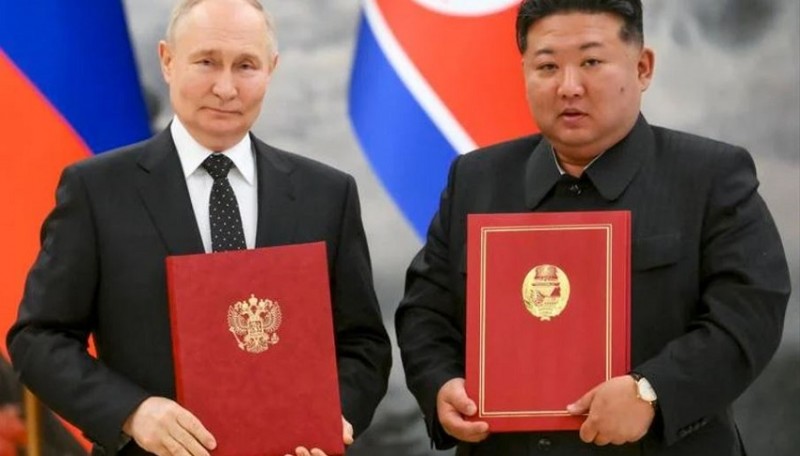
SEOUL, South Korea (AP) — Russian President Vladimir Putin and North Korean leader Kim Jong Un have hailed their newly signed strategic partnership as a breakthrough, but the full implications for their relationship remain uncertain.
The agreement, signed during a summit in Pyongyang, could be the most significant deal between the two countries since the Cold War. However, there are differing opinions on the extent of the security commitments Russia has made to North Korea.
Kim described the deal as elevating bilateral relations to the level of an alliance, although Putin was more cautious and did not use that term.
Following the summit on Wednesday, North Korean state media released the text of the agreement, which includes provisions for mutual defense assistance and broader cooperation in military, foreign policy, and trade. Russia has not yet published its version of the text.
Officials in South Korea, a regional rival, said they are still analyzing the implications, including Russia’s possible response if North Korea faces an attack.
The relationship between expansive Russia and isolated North Korea — both nuclear powers — has warmed in recent years amid Russia’s increasing friction with the West over Ukraine and internal opposition.
The new agreement could draw them even closer, posing new challenges to the international community.
What’s in the New Partnership, According to Kim and Putin:
What Did Russia Promise?
Most of the debate surrounding Putin and Kim’s comprehensive partnership agreement revolves around Article 4. According to North Korean state media, this article states that if one country is invaded and pushed into a state of war, the other must immediately deploy "all means at its disposal" to provide military and other assistance.
However, it also specifies that such actions must be in accordance with the laws of both countries and Article 51 of the United Nations Charter, which recognizes the right of a UN member state to self-defense.
Some analysts interpret this as a promise that Moscow will intervene if North Korea is attacked, echoing a commitment made under a 1961 treaty between North Korea and the Soviet Union. That treaty was abandoned after the USSR's collapse and replaced in 2000 with one offering weaker security assurances.
Cheong Seong Chang, an analyst at South Korea’s Sejong Institute, said the agreement echoes the language of the 1961 treaty and provisions of the US-South Korea mutual defense treaty about activating channels to coordinate in the event of an invasion.
"North Korea and Russia have completely revived their Cold War-era military alliance," Cheong said.
Other experts, however, are more cautious. Ankit Panda, a senior analyst at the Carnegie Endowment for International Peace, said Article 4 is carefully worded to avoid implying automatic intervention. He also questioned why the article invokes the UN Charter.
Nevertheless, the broader picture is that "both sides are willing to document and demonstrate to the world how extensively they intend to expand the scope of their cooperation," Panda said.
How Far Will Military Cooperation Go?
Putin linked military cooperation with North Korea to Western supplies of weapons to Ukraine, referring to high-precision weapons systems, warplanes, and other high-tech weapons.
"The Russian Federation does not exclude the development of military-technical cooperation with the Democratic People’s Republic of Korea in accordance with the document signed today," Putin said.
This statement effectively formalizes something Western countries allege is already happening.
The US and other allies claim Russia has received ballistic missiles and ammunition from North Korea as the Ukraine war depletes Moscow’s inventory, and that Russia has transferred technology to Pyongyang that could enhance the threat posed by Kim’s nuclear weapons and missile program.
North Korean state media said the agreement requires the countries to take steps to strengthen their joint defense capabilities but did not specify whether they would include combined military training.
The agreement also calls for the countries to actively cooperate in efforts to establish a "just and multipolar new world order," North Korea's Korean Central News Agency said, highlighting how the countries are aligning amid their separate, escalating confrontations with the United States and its allies.
Panda said the agreement's language about joint measures on strengthening defense capabilities is "broadly indicative of continued cooperation on a range of technical initiatives."
What’s the Economic Aspect of the Pact?
The partnership also calls for developing economic ties, an especially important issue for North Korea under international sanctions. North Korea needs goods and material and can supply Russia’s war-depleted workforce with labor; those workers can then convert wages in rubles to dollars or euros and send hard currency back home.
Putin said Russian-North Korean trade turnover has risen ninefold over the past year, but admitted that the amount itself remains "modest."
Ahead of the summit, South Korean analysts said North Korea might seek to increase labor exports to Russia and other activities to obtain foreign currency in defiance of UN sanctions, although the sensitive details of the agreements between Kim and Putin are unlikely to be publicized. The text published by North Korea called for strengthened cooperation in a broad range of areas, including trade, science, technology, and tourism.
Putin Pledges Solidarity with Kim Jong Un to Overcome Sanctions
Russia and North Korea Deepen Ties as Putin Visits Pyongyang
North Korea Deploys Trash-Filled Balloons, Escalates Border Conflict, All You Need to Know